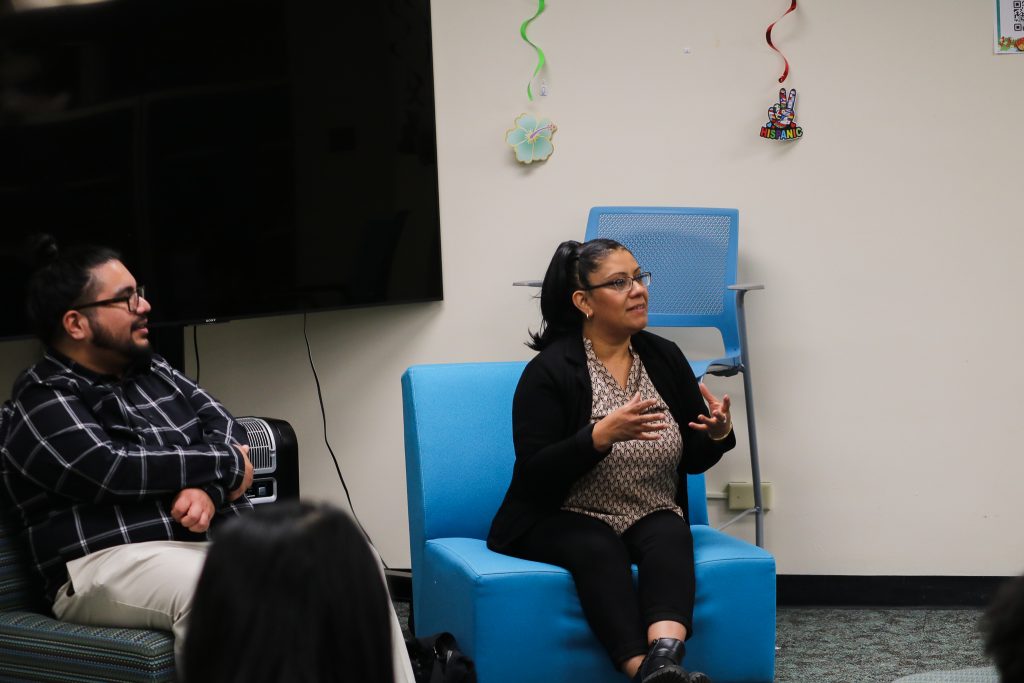In commemoration of Hispanic and Latin Heritage Month, restaurateur Thanya Ledezma visited Binghamton’s Multicultural Resource Center last Thursday to speak about entrepreneurship and heritage as the owner of Azul Oneonta, a Mexican restaurant in Oneonta, New York.
The event was part of the MRC’s Culture Chat series, which offers a forum to share diverse perspectives among community members, colleagues and students. After two years of running the family-operated small business, Ledezma explained how her background as a Hispanic woman has shaped the trajectory of her career.
Leonel Diaz, the director of intercultural affairs in the Division of Diversity, Equity and Inclusion, was inspired to invite Ledezma as a guest speaker after frequenting the restaurant as a local and learning her story.
“Her restaurant has become a hub for people of Latin American culture to come into the place and get a little bit of home, a little bit of culture and celebrate it in the community,” said Diaz, who identifies as Mexican and Indigenous Mayan. “Something that she spoke to is that she is seeing a rise of people coming out. Myself and my housemates [who are] also Dominican, we support the business.”
Before immigrating to the United States from Mexico over a decade ago, Ledezma studied business administration and finances at the Escuela Bancaria y Comercial. A Mexico City native, she discovered her interest in food early on by cooking with her family, learning traditional recipes from her mother and grandmother.
Before the opening of Azul Oneonta, Ledezma managed a restaurant out of Greenane Farms in Meridale, New York with her ex-husband, Patrick Rider. At Greenane Farms, Ledezma implemented a sustainable farm-to-table practice, where they grew their own produce and ethically raised livestock directly on the land.
The rural farm and restaurant became a popular destination for visitors from as far as Buffalo, who would travel hours to try traditional Mexican dishes. However, following Ledezma’s and Rider’s recent divorce, Ledezma left the business and needed to move on with her future — now “halfway [into her] life with nothing.”
“I thought, ‘people don’t know me,’” Ledezma said. “They really don’t know me. They know the farm. They know me as a Thanya Rider, not as a Thanya Ledezma. Now I have to show myself and stand up for myself and show that this is who I am and I can do this. The only thing that saved me was my knowledge.”
With the support of her extended family and friends, Ledezma decided to move to Oneonta and launch her restaurant in 2022. Azul Oneonta, a Mexican eatery primarily staffed by Ledezma’s relatives, quickly evolved into a local establishment in the city’s Southside Mall. Modeled after Greenane Farm’s approach to sustainability, all items are crafted from scratch with simple, fresh ingredients for quality and consistency.
Through working and managing her own restaurant, Ledezma has been able to integrate her affinity for organization and a lifelong appreciation of the culinary arts. Ledezma collaborates with her sister, a professionally trained chef, to curate a menu inspired by staples they had growing up. Incorporating her Mexico City roots, Ledezma fuses Puebla and Oaxaca elements when preparing homemade recipes like mole, a culturally emblematic salsa with over 30 ingredients.
After her previous marriage, Ledezma learned to adapt the vibrant flavor profile of Mexican cuisine to accommodate the American palette — an effective skill when serving the predominantly white community of Oneonta.
“Without noticing, I started training to do the food in some way that is not spicy but still [has] the flavors,” said Ledezma, who approaches everything from cooking to bookkeeping methodically. “I know how to make the sauces without compromising flavor and without making it spicy. I find out my way to do my own procedures to make everything. I think with my American family, my American side, I was getting trained.”
As a female entrepreneur and a single mother to four kids, Ledezma also provided insight into her mentality for success over the years. She encouraged others to lead with confidence and be receptive to feedback, taking criticism as an opportunity to learn and grow. At the end of the conversation, attendees were invited to sample trays of homemade enchiladas with salsa verde and rice — popular items on Azul Oneonta’s menu.
Diaz elaborated on the significance of coming together to reinvest in the community and support small businesses like Ledezma’s.
“We support each other because statistically our money, as communities of color, doesn’t stay in communities of color,” Diaz said. “It always exits very quickly and so it’s our way of making sure that my own money goes back into my own community, to support their business in hopes that others continue to do the same.”
The solidarity and reception surrounding Azul Oneonta have encouraged Ledezma to grow the business into a full-fledged brand. She is in the process of creating a line of commercial products like salsas, tamales and tortillas to sell in retail stores, responding to recent demand and the expanding Latino presence in the Southern Tier.
“I think confidence is the main thing,” Ledezma said. “It’s the main thing and you have to not just believe it or just think it — you’ve got to believe it and you’ve got to project that. Because if you don’t project confidence, they’re not going to trust you. We have a saying in Mexico that says, ‘te ven como te tratan.’ They treat you as they see you.”



